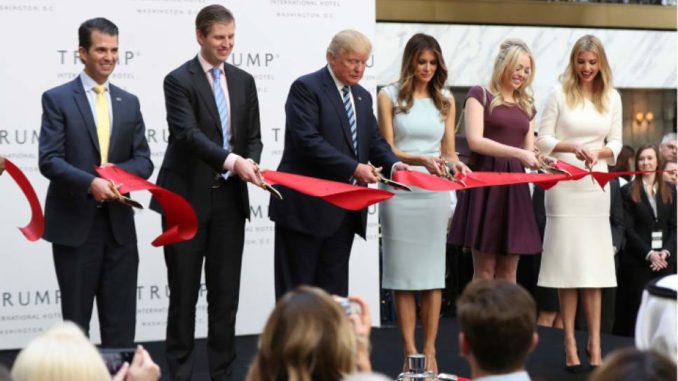
By Steve Holland and Melissa Fares
NEW YORK (Reuters) – U.S. President-elect Donald Trump vowed on Wednesday to step back from running his global business empire to avoid conflicts of interest but gave few immediate details as concern over his dual role mounts ahead of his Jan. 20 inauguration.
Trump, a real estate magnate who owns hotels and golf resorts from Panama to Scotland, said he would spell out at a Dec. 15 news conference how he will separate himself “in total” from his worldwide business holdings, which include a winery, modelling agency and a range of other businesses.
After Trump won the Nov. 8 election, his company, the Trump Organization, had said it was looking at new business structures with the goal of transferring control to Donald Trump Jr., Ivanka Trump and Eric Trump – three of his adult children who are involved with the company.
Trump gave few details in a series of early morning tweets but said that “legal documents are being crafted which take me completely out of business operations” and that his children would attend the news conference. He did not say what the planned change might mean for ownership of his businesses.
Although Trump’s fellow Republicans generally take a more laissez faire stance toward business than Democrats, the president-elect will travel to Indiana on Thursday to formally announce a deal he reached with United Technologies Corp (UTX.N: Quote) to keep close to 1,000 jobs at its Carrier Corp air conditioner plant in Indianapolis rather than have them moved to Mexico.
Trump and his running mate, Mike Pence, the governor of Indiana, railed against Carrier on the campaign trail, using the company’s outsourcing move as an example of how trade agreements hurt American workers.
‘HE NEEDS TO SELL THE BUSINESSES’
Critics have raised questions about the role of Trump’s children, who are on the executive committee of his White House transition team. His daughter Ivanka joined a telephone call her father had with Argentine President Mauricio Macri earlier this month and attended a meeting with Japanese Prime Minister Shinzo Abe, creating concerns about possible conflicts of interest.
A brand name around the globe, Trump previously argued he had no need to separate himself from the Trump Organization, which includes a hotel down the street from the White House, a Manhattan tower where he lives and is running his transition to office, and a New Jersey golf course where he interviewed Cabinet candidates earlier this month.
Trump said on Wednesday he was not required by law to alter his relationship with his business, but added: “I feel it is visually important, as president, to in no way have a conflict of interest with my various businesses.”
As the Republican heads toward taking over the White House from Democratic President Barack Obama, scrutiny of potential conflicts has grown. Democratic lawmakers on Capitol Hill called for hearings on the issue.
Rules on conflict of interest for executive branch employees do not apply to the president, but Trump will be bound by bribery laws, disclosure rules and the U.S. Constitution, which bars elected officials from taking gifts from foreign governments.
The nonpartisan Office of Government Ethics, a government office that oversees ethics programs for the executive branch, issued a statement saying it applauded Trump’s aims and appearing to suggest that he completely shed his holdings.
“Divestiture resolves conflicts of interest in a way that transferring control does not,” it said.
Richard Painter, who served as the chief ethics lawyer to former Republican President George W. Bush, concurred.
“He needs to sell the businesses not just have someone else manage them for him,” Painter, a professor at the University of Minnesota Law School, said in an emailed comment.
WALL STREET PICKS
Trump, a former reality TV star, has spent much of the past few weeks setting up his Cabinet and interviewing candidates for top jobs in his administration.
On Wednesday, Trump said he would nominate his chief campaign fundraiser, Steven Mnuchin, to lead the U.S. Treasury. Mnuchin said the administration would make tax reform and trade pact overhauls top priorities as it seeks a sustained pace of 3 percent to 4 percent economic growth.
Mnuchin, a former Goldman Sachs banker, also signalled a desire to remove U.S. mortgage-finance companies Fannie Mae and Freddie Mac from government ownership, a move that could have wide-ranging ramifications for how Americans pay for their homes, and said banking regulations should be eased to spur lending.
Trump named Wilbur Ross, a billionaire known for his investments in distressed industries, as his nominee for commerce secretary. Both nominees will require confirmation by the U.S. Senate.
Trump is also considering Goldman Sachs President and Chief Operating Officer Gary Cohn, a former commodities trader, to head his White House budget office or to fill another position, a Trump transition official said.
The economic picks were praised by the Business Roundtable, a group that represents America’s largest corporations.
But U.S. Senators Bernie Sanders and Elizabeth Warren called Mnuchin “just another Wall Street insider.”
“That is not the type of change that Donald Trump promised to bring to Washington – that is hypocrisy at its worst,” Sanders, a Vermont independent who ran for the 2016 Democratic presidential nomination, and Warren, a Massachusetts Democrat, said in a joint statement.
Trump pledged during his campaign to “drain the swamp” in Washington. A spokesman said giving top economic jobs to Wall Street figures was not inconsistent with that vow.
“You want some people that are insiders and understand the system and some outsiders that are creative thinkers, out-of-the-box thinkers and disruptors,” said Anthony Scaramucci, an asset manager who is on Trump’s transition committee.
Trump is also working to fill out his foreign policy team, but no decision appeared imminent on who the next secretary of state would be.
(Additional reporting by David Lawder and Eric Walsh in Washington and Melissa Fares in New York; Writing by Roberta Rampton and Arshad Mohammed; Editing by Alistair Bell and Peter Cooney)